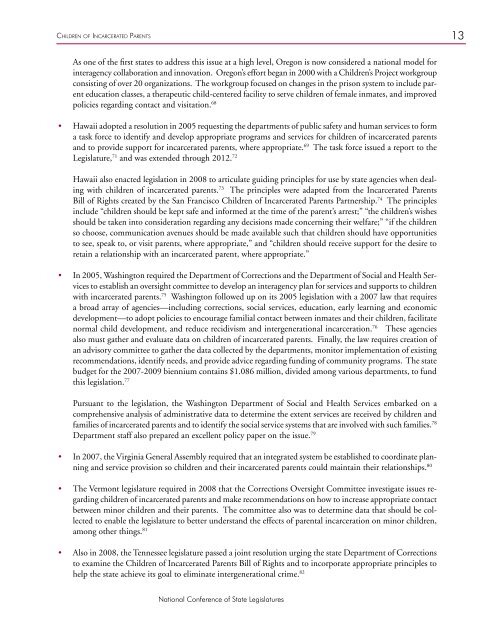Children of Incarcerated Parents
Children of Incarcerated Parents
Children of Incarcerated Parents
Create successful ePaper yourself
Turn your PDF publications into a flip-book with our unique Google optimized e-Paper software.
Ch i l d r e n o f In c a r c e r at e d Pa r e n t s 13<br />
As one <strong>of</strong> the first states to address this issue at a high level, Oregon is now considered a national model for<br />
interagency collaboration and innovation. Oregon’s effort began in 2000 with a <strong>Children</strong>’s Project workgroup<br />
consisting <strong>of</strong> over 20 organizations. The workgroup focused on changes in the prison system to include parent<br />
education classes, a therapeutic child-centered facility to serve children <strong>of</strong> female inmates, and improved<br />
policies regarding contact and visitation. 68<br />
• Hawaii adopted a resolution in 2005 requesting the departments <strong>of</strong> public safety and human services to form<br />
a task force to identify and develop appropriate programs and services for children <strong>of</strong> incarcerated parents<br />
and to provide support for incarcerated parents, where appropriate. 69 The task force issued a report to the<br />
Legislature, 71 and was extended through 2012. 72<br />
Hawaii also enacted legislation in 2008 to articulate guiding principles for use by state agencies when dealing<br />
with children <strong>of</strong> incarcerated parents. 73 The principles were adapted from the <strong>Incarcerated</strong> <strong>Parents</strong><br />
Bill <strong>of</strong> Rights created by the San Francisco <strong>Children</strong> <strong>of</strong> <strong>Incarcerated</strong> <strong>Parents</strong> Partnership. 74 The principles<br />
include “children should be kept safe and informed at the time <strong>of</strong> the parent’s arrest;” “the children’s wishes<br />
should be taken into consideration regarding any decisions made concerning their welfare;” “if the children<br />
so choose, communication avenues should be made available such that children should have opportunities<br />
to see, speak to, or visit parents, where appropriate,” and “children should receive support for the desire to<br />
retain a relationship with an incarcerated parent, where appropriate.”<br />
• In 2005, Washington required the Department <strong>of</strong> Corrections and the Department <strong>of</strong> Social and Health Services<br />
to establish an oversight committee to develop an interagency plan for services and supports to children<br />
with incarcerated parents. 75 Washington followed up on its 2005 legislation with a 2007 law that requires<br />
a broad array <strong>of</strong> agencies—including corrections, social services, education, early learning and economic<br />
development—to adopt policies to encourage familial contact between inmates and their children, facilitate<br />
normal child development, and reduce recidivism and intergenerational incarceration. 76 These agencies<br />
also must gather and evaluate data on children <strong>of</strong> incarcerated parents. Finally, the law requires creation <strong>of</strong><br />
an advisory committee to gather the data collected by the departments, monitor implementation <strong>of</strong> existing<br />
recommendations, identify needs, and provide advice regarding funding <strong>of</strong> community programs. The state<br />
budget for the 2007-2009 biennium contains $1.086 million, divided among various departments, to fund<br />
this legislation. 77<br />
Pursuant to the legislation, the Washington Department <strong>of</strong> Social and Health Services embarked on a<br />
comprehensive analysis <strong>of</strong> administrative data to determine the extent services are received by children and<br />
families <strong>of</strong> incarcerated parents and to identify the social service systems that are involved with such families. 78<br />
Department staff also prepared an excellent policy paper on the issue. 79<br />
• In 2007, the Virginia General Assembly required that an integrated system be established to coordinate planning<br />
and service provision so children and their incarcerated parents could maintain their relationships. 80<br />
• The Vermont legislature required in 2008 that the Corrections Oversight Committee investigate issues regarding<br />
children <strong>of</strong> incarcerated parents and make recommendations on how to increase appropriate contact<br />
between minor children and their parents. The committee also was to determine data that should be collected<br />
to enable the legislature to better understand the effects <strong>of</strong> parental incarceration on minor children,<br />
among other things. 81<br />
• Also in 2008, the Tennessee legislature passed a joint resolution urging the state Department <strong>of</strong> Corrections<br />
to examine the <strong>Children</strong> <strong>of</strong> <strong>Incarcerated</strong> <strong>Parents</strong> Bill <strong>of</strong> Rights and to incorporate appropriate principles to<br />
help the state achieve its goal to eliminate intergenerational crime. 82<br />
National Conference <strong>of</strong> State Legislatures

















